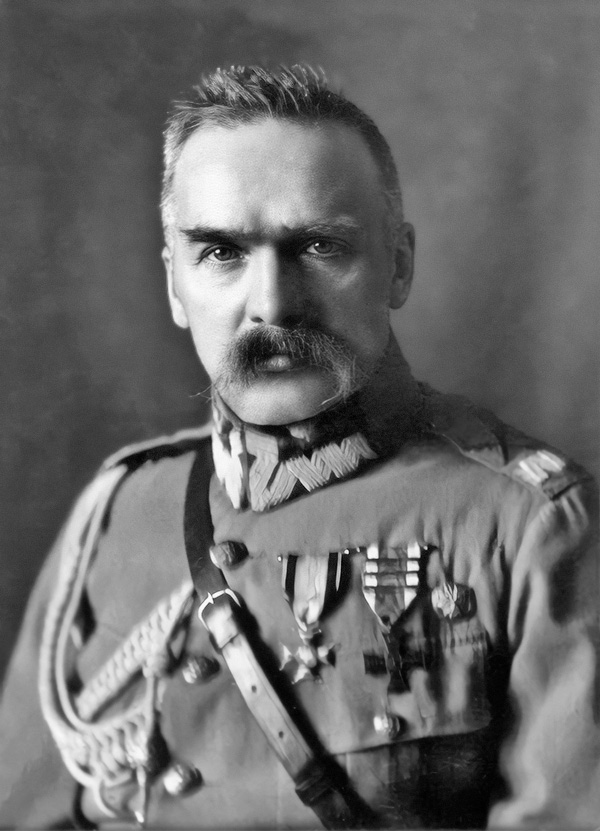Exactly 156 years ago, on 5th December 1867, Józef Piłsudski was born in the estate manor of Zułów in Lithuania. He was an exile, socialist, marshal, and above all co-founder of the independent Polish state and a man who united and shaped the Polish nation in the inter-war period.
From his earliest years, Piłsudski was brought up in the ethos of the January Insurrection of 1863, during which his father Józef Wincenty served as a commissioner of the National Government for the Rosienie district. In addition to his patriotic upbringing, he received a thorough education. His mother Maria, a noblewoman from the Bilewicz family, provided her children with a home education, bringing in private teachers.
In 1877, Piłsudski began his education at the First Vilnius Gymnasium. Opposing the Russification process, he co-founded the “Cohesion” self-education club, making attempts to import Polish books from Warsaw. After passing his matriculation exams, he was accepted to study medicine at the Imperial Kharkov University.
Due to his contacts with the Russian revolutionary organisation “Will of the People”, as early as March 1887 he was arrested by the Tsarist police and sentenced to five years’ exile in Siberia on charges of participating in a plot to assassinate Tsar Alexander III Romanov. In July 1892, Piłsudski returned to Vilnius and joined the socialist movement, first as a correspondent of the underground magazine Przedświt (Pre- Dawn), and then as a co-founder of the Polish Socialist Party, already running the secret Robotnik (Worker) printing house in Łódź.
In February 1900, he was again arrested for conspiratorial activity and imprisoned in the 10th Pavilion of the Warsaw Citadel. As a result of the fact that he began to simulate mental illness there, he was transported to the St Nicholas the Miracle Worker’s Hospital for the Insane in St Petersburg, from where he escaped with the help of party comrades.
During the 1905 Revolution, which broke out on the territory of the Russian Empire, Pilsudski co-founded the PPS Fighting Organisation. For several years, its members put up armed resistance against the army and the tsarist governors, carrying out numerous assassinations, sabotage, and diversion actions. Piłsudski personally took part in an attack on a Russian postal train near Bezdany, raising funds for the creation of the underground Union of Active Struggle, which enabled further national liberation struggles.
After the outbreak of the First World War, he co-founded the Polish Legions fighting alongside the Austro-Hungarian Empire. As a result of the so-called oath crisis, during which he personally recommended Polish soldiers not to swear allegiance to the Germans, he was arrested and imprisoned in the Magdeburg fortress.
As a result of the outbreak of the Bolshevik Revolution in Russia and the victories of the Entente states, Piłsudski returned to independent Poland as early as on 10 November 1918, taking over power in the country from the representatives of the Regency Council and Ignacy Daszyński – Prime Minister of the Provisional People’s Government of the Republic of Poland in Lublin.
In the years 1918-1922, he was Chief of State, and from 19 March 1920 Marshal of Poland. In his first period in power, he was given authority over the Polish Army and entrusted with the mission of organising a nationwide government. At that time, he appointed the socialist Jędrzej Moraczewski as Prime Minister, whose Cabinet adopted several innovative laws of a democratic nature, including universal suffrage (including for women), an eight-hour working day, a guarantee of the legality of trade unions and the introduction of a labour inspectorate and sickness insurance.
Despite the many difficulties involved in consolidating a country ruined and divided by partitions, Poland under Piłsudski resisted the Bolshevik invasion of 1920. Winning the war, paradoxically revealed the erroneous assumptions of Piłsudski’s concept of a federated state based on the former, ethnically diverse lands of the Polish Republic, in favour of a vision of a nation-state. The latter was promoted by his greatest adversary, Roman Dmowski.
In 1922, Piłsudski withdrew from political activity, devoting his time to military matters. In July 1923, he stepped down as Chairman of the Office of the Supreme War Council and devoted himself to writing, usually staying at his manor house in Sulejówek near Warsaw.
Due to the deteriorating political and social situation in the country and the instability of successive governments, he led a coup d’état (the so-called May Coup) on 12 May 1926, forcing the resignation of Wincenty Witos’s government. From then on, power in the country was exercised by people associated with Piłsudski, creating an authoritarian system based on the military.
Piłsudski himself was Prime Minister twice. The first time between 1926 and 1928, and the second after 1930, when, at his request, President Ignacy Mościcki dissolved the Sejm, allowing for the so-called Brest Trial to be held, which convicted politicians who did not support the Marshal’s actions.
By that time, Piłsudski was already seriously ill. Five years later, on 11 May 1935, he suffered a stomach haemorrhage. He died the following day at the Belvedere, exactly on the 9th anniversary of the May Coup. His funeral was a great patriotic manifestation. He was buried with the highest honours in the crypt under the Tower of the Silver Bells on the Wawel Hill in Kraków, while his heart was laid to rest with his mother in the Rasos (Rossa) Cemetery in Vilnius.
Despite the many controversies that Piłsudski’s political activities aroused, he was the undisputed leader of independent Poland, who managed to consolidate the Polish nation after 123 years of partition.





